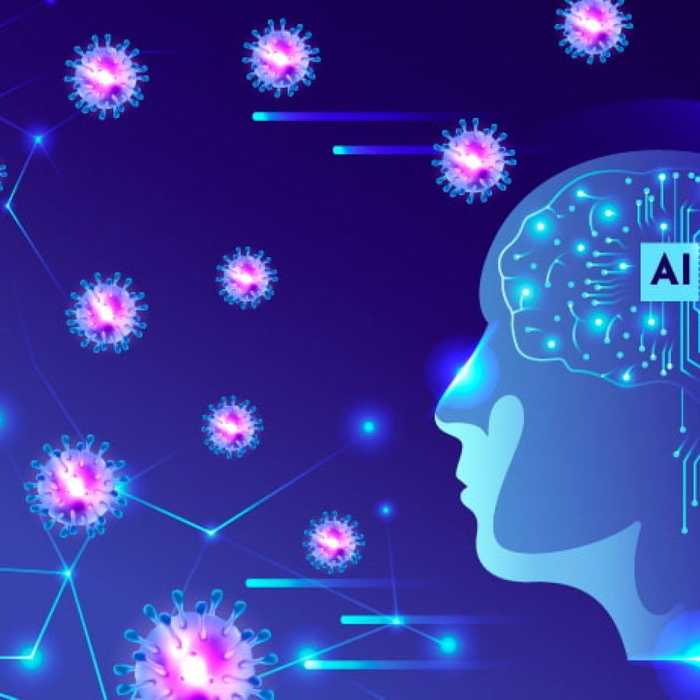AI-Vs-COVID-19
The World’s AI Defenses Against Coronavirus
The coronavirus pandemic has caused serious panic all over the world by infecting about 4 million worldwide and taking more than 200 thousand lives. The entire world is seeking a way to stop it. As AI technology evolves daily. Appearing in smart cars, IOT devices, banking, healthcare, and logistics.one is left to wonder what role this sort of technology plays in fighting this disease. Can it help make a difference? It can help and has been helping all along. AI systems all over the world have been used against the Covid-19 outbreak.
First up is BlueDot an artificial intelligence platform that uses AI processing to analyze information and track over a hundred infectious diseases. The idea behind it was to “Spread knowledge faster than the diseases spread themselves,” says Kamran Khan, founder, and CEO of BlueDot.
On Dec, it flagged an unusual pneumonia cluster happening in a market in Wuhan, China. The next day BlueDot issued a warning to its Customers to avoid Wuhan. This was nine days ahead of both the World Health Organization (WHO) and the US Centers for Disease Control and Prevention (CDC) who didn’t alert the public until January 2020. BlueDot also predicted where other outbreaks could be by analyzing traveler itineraries and flight paths. The system succeeded in carrying out its creator’s vision and saving who knows how many lives.
Next, we have Insilco Medicine‘s AI technology for drug discovery in Hong Kong, the company was able to identify thousands of molecules for potential medications in just four days. It also started an open policy by making all its research and findings available for download for free on its website; an action that allowed a global-wide contribution to fighting the disease. They were able to narrow down the potential medications to seven possible molecules. They intended to make and test these molecules, but their plan was delayed as Over 20 of their contract chemists were quarantined in Wuhan.
However, they managed to synthesize two of the seven molecules, and they plan to put them to the test in the nearby future. Insilico is also actively looking into drugs for improving the immune system of the elderly—so an older individual may respond to the infection as a younger person does, with milder symptoms and faster recovery. In addition to drugs that help restore lung function after infection.
Furthermore, the SRI International research center headquartered in California, and AI company Iktos in Paris announced their collaboration in March. Using Iktos’ generative deep learning modeling technology combined with SRI’s SynFini, a fully automated end-to-end synthetic chemistry system, to design compounds and accelerate the identification of drug candidates to treat multiple viruses, including influenza and the coronavirus. They hope the collaboration can make a difference and speed up the identification of promising new therapeutic options for the treatment of COVID-19.
Moreover, there is Benevolent AI, a leading British company in the application of AI and machine learning in the discovery and development of medications. It launched an operation back in February using its platform for drug discoveries to identify an approved drug that could potentially stop the disease’s progression their results lead to proposing baricite, an already approved drug developed by Eli Lilly originally for the treatment of rheumatoid arthritis, as a potential treatment with both anti-viral and anti-inflammatory properties, for COVID-19 patients admitted to hospital prior to the development of critical lung damage.
In April 2020, Benevolent revealed that the potential drug will be entering late-stage phase 3 clinical trials to treat the disease. Later on, trials will also be held in the US.
On the other hand, China was able to weaponize its AI systems in the fight against the pandemic by associating AI with control over the spread by using robots for diagnostic checks. Saving the lives of hospital staff and avoiding risks.
Additionally, the Chinese government used AI-controlled drones to supervise the curfew and safety processions on the streets. Along with creating an app that allows the user to check if they have been on a flight or a train with a confirmed coronavirus case. Plus, In the Hangzhou city ambulances are provided with AI systems to speed through traffic.
Thanks to AI many contributions have been made to the current situation. Researchers all over the world are working to better utilize AI technology so that, one day soon one of these systems will come through and be our way to survive this disease and any further future outbreaks.
References:
- Coronavirus: AI steps up in battle against Covid-19.” By Jane Wakefield, BBC News, 18 April 2020. (www.bbc.com/news/technology-52120747 )
- How this Canadian start-up spotted coronavirus before everyone else knew about it.” By Cory Stieg, Cnbn, 3 March 2020. (https://www.cnbc.com/2020/03/03/bluedot-used-artificial-intelligence-to-predict-coronavirus-spread.html)
- Iktos and SRI International Announce Collaboration to Combine Artificial Intelligence and Novel Automated Discovery Platform for Accelerated Development of New Anti-Viral Therapies”, SRI.com, 3 March 2020. (https://www.sri.com/iktos-and-sri-international-announce-collaboration-to-combine-artificial-intelligence-and-novel-automated-discovery-platform-for-accelerated-development-of-new-anti-viral-therapies/press-release/)
